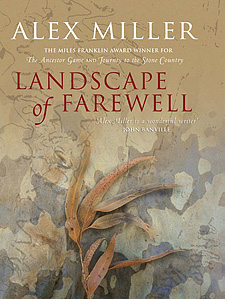 Landscape of Farewell was an interesting experience for me. It was a journey into the inner world of men. It treated subjects that, as a woman, I am familiar with: friendship, finding meaning and reconciliation. Yet it was all from the perspective of males.
Landscape of Farewell was an interesting experience for me. It was a journey into the inner world of men. It treated subjects that, as a woman, I am familiar with: friendship, finding meaning and reconciliation. Yet it was all from the perspective of males.
Alex Miller is one of Australia's most successful authors, having won the Miles Franklin Award twice, most recently for Journey to the Stone Country. In this novel he again explores Aboriginal themes and relationship with the land. There are other parallels, like a fascination with European explorers, and characters from the world of academia.
In Landscape of Farewell, we are introduced to Max Otto, a German historian who is mourning the death of his wife, and about to make his farewell speech at his university. He has given up on the living, wanting to just fade away from the pain of his unfulfilled academic dreams, and only delivers a substandard paper. In the audience is a passionate Australian Aboriginal academic, the well-named Vita, who tells him his paper is crap and invites him to Australia to do a better job at her conference.
To his own surprise Max accepts. Vita is a force Max seems powerless to resist, and suddenly he finds himself spending an indefinite period of time on a remote farm with Vita's Uncle Dougald. Vita says the experience will do them both good because they are recent widowers, but she is perplexed when every time she calls Max for an update, he tells her that the subject of their wives’ deaths has not been raised.
Like Vita I was frustrated by the lack of conversation between the two men. They seemed to spend most of their time doing things: farm chores, short trips. However, there is subtle change, for both men, individually and in terms of their relationship.
Max finds himself relaxing, not realising how stressed he had been. He is enjoying the comfortable silence and growing sense of companionship with Dougald. There in the wide open spaces of the outback, Max is able to finally confront a series of issues he has been avoiding: he is able to openly grieve the loss of his wife; and he is forced to deal with his father's duplicity as a German soldier during the Second World War.
Dougald too, is growing, finding that Max is someone who can help him face his own demons. He asks Max to write his story, the oral history of a past massacre involving his Aboriginal ancestor. These two men, from dramatically different cultures, end up being able to be a gift to each other, find a resonance in the other, and open up the unexpected opportunity for confession.
This is a significant book, beautifully written. While Max and Dougald represent important historical events, the narrative forces all readers to consider our contribution to the suffering of others, whether by activity or inactivity, whether intentional, or simply by a lack of attention.
The prose is lyrical, descriptions are sparse yet vivid, the characters are real, the plot is engaging and the themes are momentous. I strongly recommend Landscape of Farewell.




























